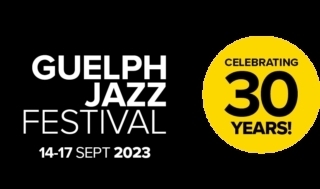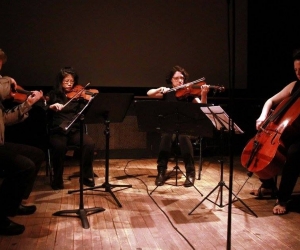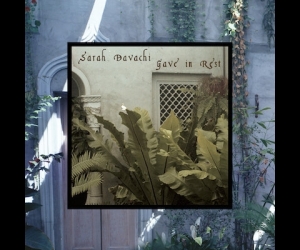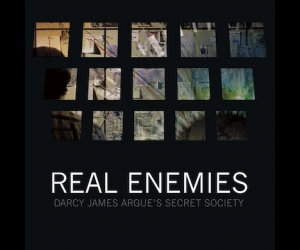
The Guelph Jazz Festival celebrated its thirtieth anniversary this year, a significant milestone for the forward-looking festival. The festival presented free park concerts in far-flung neighborhoods, which they began doing during the COVID-19 years, as well as ticketed concerts in multiple venues and open air street events.
The concurrent colloquium, presented by the International Institute for Critical Studies in Improvisation, was called “The Third Decade: Forging a Legacy of Improvisation at the Guelph Jazz Festival.” Along with a few international performers, this year’s festival offered a special perspective on Canada’s fertile network of improvising musicians.
For an event conceived around issues of meaning and pluralism in jazz, there might be no better headliner currently available than the English-Swedish-French quartet أحمد [Ahmed]: saxophonist Seymour Wright, pianist Pat Thomas, bassist Joel Grip, and drummer Antonin Gerbal (a conventional ordering of roles that أحمد [Ahmed] deconstructs just as its naming insists on plurality), dedicated to a revival of the work of Ahmed Abdul-Malik (born Jonathan Tim, Jr.), an African-American bassist and composer whose music integrates (or perhaps better, emphasizes) North African and Middle Eastern elements in jazz. أحمد [Ahmed] reorganizes the jazz band just as John Coltrane did sixty years ago, now moving the insistent drone pitch from the bass to the saxophone, making Wright’s piercing, staccato monotone a central event. Piano and drums receive a polyrhythmic dialogue, and the bass elaborates long ostinatos into melody from the outset, the reconfigured roles reimagining the band as drum kit with a transformative energy.
American pianist Cory Smythe, another shining import, expands the piano with a virtual electronic double in explorations of the traditional repertoire of standards in the light of contemporary environmental and social concerns. Thus “Smoke Gets in your Eyes”—presented with keyboard clicking, epic runs, and bizarre electronic eruptions—referenced global warming.
Clarinetist François Houle led his Genera Sextet on In Memoriam, dedicated to his late friend Ken Pickering, the Vancouver Jazz Festival director who advised Houle on the personnel for the international group heard here: trumpeter Marco von Orelli, trombonist Jeb Bishop, pianist Benoît Delbecq, bassist Michael Bates, and drummer Harris Eisenstadt. Houle also played the first half of a two-part commemoration of the twentieth anniversary of Steve Lacy’s remarkable 2003 performances in Guelph following his diagnosis of liver cancer. The Coastlines Duo of Houle and Bostonian Jorrit Dijkstra brought virtuoso élan to Lacy’s duets for clarinet and soprano saxophone, the two distinct reed instruments delivering soaring, contrasting lines in the same high register. The second half of this moving event presented the Susanna Hood Trio performing Packet, Lacy’s setting of poems by Judith Malina. Vocalist Hood was unable to attend, leaving pianist Tania Gill and saxophonist Kayla Milmine to read each poem before performing its score. The duo performed admirably, enhanced by this convergence of absences.
This year’s edition reflected the festival’s defining motif: the far-flung network of collaborators and transplants that contribute so much to Canadian improvised music, perhaps even defining it. This was made possible by festival director Scott Thomson’s first-hand bandstand knowledge, gained during long stays in Toronto and Montreal and frequent touring further afield. Violinist Josh Zubot, who led the quintet Strings, was born in Saskatchewan, established his career in Montreal, and migrated to British Columbia in 2017. Strings includes Vancouverite cellist Peggy Lee, from Toronto, while Zubot still performs with Nicolas Caloia’s Montreal-based Ratchet Orchestra.
Composer and bassist Caloia’s twenty-member orchestra, one of the crucial achievements of current Canadian jazz, continues to develop after thirty years and is enlivened by some of Canada’s most imaginative musicians. The stellar reed section includes saxophonists Yves Charuest and Jean Derome and clarinetist Lori Freedman, a Toronto native. The group also contributed to two creative duos: Silvervest (Caloia and singer, composer, and lyricist Kim Zombik), and Certain Crafts (the mercurial imaginations of Charuest and dancer Alanna Kraaijeveld). While the Lina Allemano Four consists of long-time Toronto residents, Allemano divides her time between Toronto and Berlin, which feeds the quartet’s rapid evolution.
If all that suggests a tale of three cities told in a fourth one, the festival’s final performance belonged to New Hermitage, a subtle quartet with chamber music dynamics that is based in Halifax, marking the country’s Eastern extreme.


